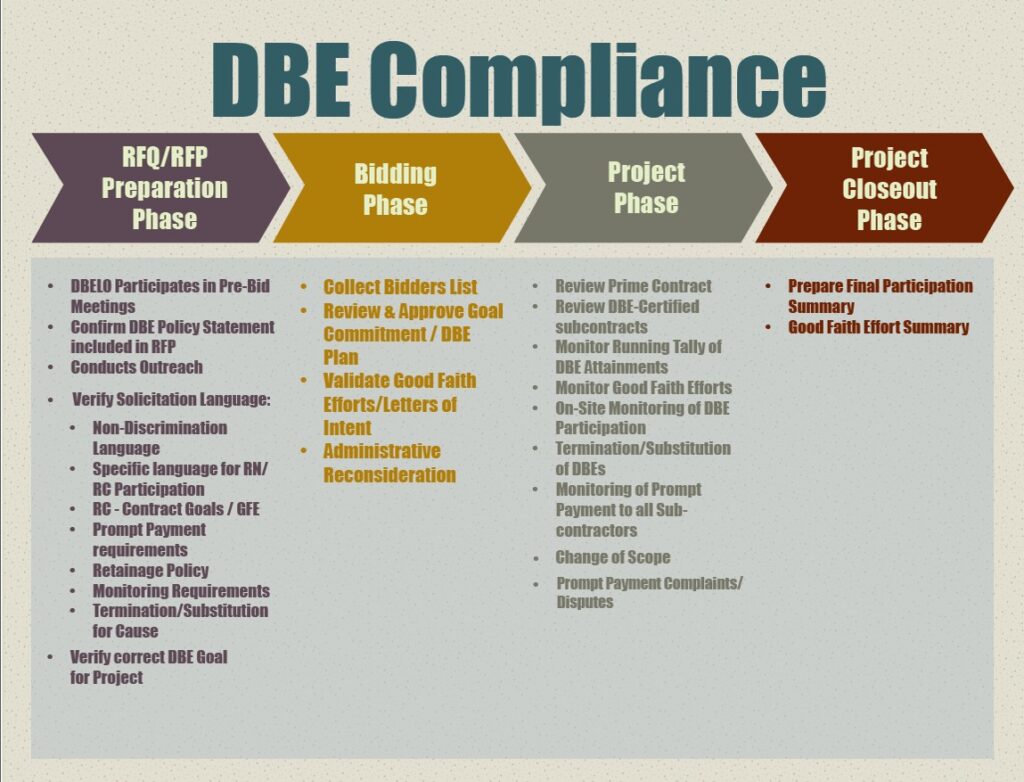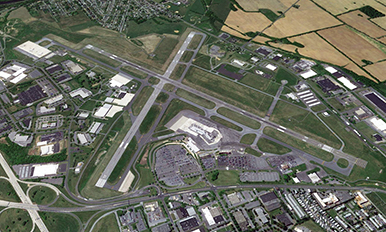Insights: DBE/ACDBE Awareness – Are You in Compliance?

Over the past several years, The FAA Office of Civil Rights has increased awareness and enforcement of the FAA Disadvantaged Business Enterprise (DBE) and Airport Concessions Disadvantaged Business Enterprise (ACDBE) Programs. 49 CFR Part 26.21 states:
“A sponsor is required to have a FAA DBE Program in place if they receive AIP grants with a cumulative total value of $250,000 or more in FAA funds in a federal fiscal year. The sponsor will continue to carry out this program until all funds have been exhausted.”
If an airport does not comply with the DBE Program also known as 49 CFR Part 26, funding can be withheld or delayed. A primary airport must also comply with the ACDBE program, 49 CFR Part 23, if they have concessions with over $200,000 in gross receipts in a federal fiscal year.
The awareness and enforcement that has increased over the last several years can be confusing and time consuming for an airport. Keeping up to date with the required regulations as well as the enforcement and documentation required for each project is essential to maintaining the airport’s eligibility for this critical federal funding.
Because DBE/ACDBE requirements interact with all aspects of the airport’s processes, the airport must have a strong team to assist their in-house Disadvantaged Business Enterprise Liaison Officer (DBELO) with developing, monitoring, and implementing their programs. The DBELO will need ongoing participation from their legal, purchasing, procurement, accounting, and other departments. Once the plan is developed the DBELO, along with these departments, will play an active role ensuring DBE and ACDBE-compliance not only by the airport but also by everyone on a project from consultants and primes to DBE and Non-DBE subcontractors and suppliers or with a concession.
As part of the DBE/ACDBE Programs, the airport establishes triennial achievement goals for both ACDBE and DBE and submits to the FAA Office of Civil Rights for approval. Although this process has been in place since 1987, with the recent increase in federal scrutiny over the past 3-5 years, the FAA actively reviews an airports ACIP and compares it to their DBE triennial goals. If there are significant differences, the FAA will require the airport to update and resubmit their triennial goals.
Other reporting requirements and documentation are required throughout a project. The airport must keep written verification on file for a minimum of three years after a project has been closed and present to the FAA upon request. Some of these processes include:
- The airport may assess contract goals on projects or concessions to assist in achieving the triennial goal.
- Collect Bidders Data to help determine the appropriate market area for the airport.
- Determine a bidder’s compliance with the DBE goals and good faith effort requirements.
- Review prime contracts and DBE subcontracts to ensure the required language is included.
- Monitor job sites to ensure DBE/ACDBEs are performing the work they are contracted to do.
- Maintain a running tally of payments made to DBEs throughout the project to monitor the proper use of contract goals.
- Require prompt payment certifications to ensure prime contractors are paying subcontractors in a timely manner and in accordance to their states Prompt Payment Act. Payments can be withheld if certifications are not submitted to the airport.
- Written consent from the airport is required prior to a Prime contractor terminating a DBE subcontractor.
- Analyze DBE achievement at the end of a project.
- Prepare annual reports and corrective actions, as required.
An airport is required to update their DBE/ACDBE Programs if there are any significant changes within the airport or regulatory code 49 CFR Part 26 or 23. In 2018, regulatory changes regarding Prompt Payment and Monitoring Mechanisms were updated and required to be incorporated into an airports DBE program. If there are any internal changes at the airport, including assignment of a new DBELO or any procedures affecting the DBE or ACDBE programs, the airport must update these changes in their program and submit to the FAA for review and approval. If these changes are not submitted to the FAA for review and approval, or the airport’s program is dated 2018 or prior, the airport is deemed out of compliance.
It is imperative that airports communicate their DBE/ACDBE Program requirements with all parties involved in a project or a concession including participation goals, how to handle a prompt payment complaint, what forms are required and when. For the airport to effectively administer and remain in compliance with their DBE/ACDBE Programs everyone from a potential bidder to a supplier must be aware of the requirements the airport has set in place.
The FAA Office of Civil Rights is conducting audits and assessments to ensure airports are in full compliance of their DBE/ACDBE Programs and in accordance with regulations 49 CFR Part 26 and 23. Are you prepared? Do you have all your policies and procedures in place? Are you collecting the written documentation as required?
C&S Project Example
In November 2019, Lehigh Valley International Airport (ABE) was selected for a Part 23 ACDBE Compliance Assessment. Although the assessment was aimed at airport concessions, the process is the same for a Part 26 DBE Compliance Assessment.

Ryan Meyer, Director of Planning & Programming with the Lehigh-Northampton Airport Authority, and the DBELO for ABE, asked Lisa Howard at C&S for assistance and guidance with the assessment. A few of the questions were simple and easily answered. However, the majority of questions were very involved. Questions were regarding RFPs/ RFQs, contracts, monitoring, site visits, complaints, and goals. Each question required multiple and very detailed answers along with written documentation to be submitted to the FAA for review. Lisa assisted Ryan in gathering the required information and guidance on developing a few procedures and requirements that were required to ensure the airport was in compliance. Lisa compiled and submitted all required documentation to the FAA Office of Civil Rights for review. The FAA came back requesting additional information and the final assessment was submitted to the FAA for review in July 2020. The assessment brought awareness to the complexity and depth of work involved in monitoring and implementing the program. The FAA Office of Civil Rights provides valuable feedback on how the airport can improve their processes and what is needed to be in compliance with the DBE/ACDBE Programs.

C&S understands and knows the importance of airports and their need to operate while complying with federal regulations. Currently, C&S has 24 clients that we perform DBE services for, six of which are primary airports. In addition, C&S performs ACDBE services for six airports nationwide. C&S has extensive knowledge of all aspects of the DBE and ACDBE Programs and offers guidance and awareness training as needed.
If you have questions, or need assistance with your DBE and/or ACDBE Program, please feel free to reach out to Lisa at (315) 703-4325 or lhoward@cscos.com.